MARK COLVIN: The International Monetary Fund says the world economy is in danger of another 1930s crash.
It would see countries defaulting on their debt and widespread panic on global financial markets.
The IMF forecast came after European finance ministers failed to reach a debt restructuring agreement with private bond holders in Greece last night.
As David Taylor reports there are now just weeks remaining before Greece's economy reaches the point of no return.
DAVID TAYLOR: European finance leaders are running out of time. Last night saw yet another failure of European ministers to negotiate a plan to keep private bond holders at bay.
Key figures from the leadership team commissioned to solve the crisis are no longer shy about where they see things are headed.
CHRISTINE LAGARDE: We could easily, easily, slide into what we call a 1930s moment. A moment where trust and cooperation break down and countries turn inward. A moment ultimately leading to a downward spiral that could very much engulf the entire world.
DAVID TAYLOR: International Monetary Fund managing director Christine Lagarde.
But they're not giving up without a fight.
CHRISTINE LAGARDE: I believe that we can avoid such a scenario. I say this for a simple reason; because we know what must be done.
DAVID TAYLOR: That includes increasing the size of the massive European bailout fund and imposing fire walls around the more robust European economies to prevent financial contagion, a financial contagion that could eventuate if Greece suffers a disorderly default on its debt.
At this point, that's exactly where we are headed.
Last night a group representing private Greek investors met with finance ministers to negotiate new terms for their holdings.
The authorities need the investors to accept some pretty dismal returns on their investments, huge losses to be exact. Understandably they're reluctant to do that but they may have no choice.
Russell Jones is the global head of fixed income strategy at the Westpac Bank.
RUSSELL JONES: To allow that to happen you have to have an interest rate which is comfortable for them. If it's too high, quite simply they will default on their bonds, they won't pay anybody back anything and that's not what the authorities want.
DAVID TAYLOR: But as investors walked away from the negotiating table last night, they increased the chance they'll receive absolutely nothing. That's because Greece is unlikely to receive any more aid money if it's unable to strike a deal with those debt investors. That would leave Greece facing complete financial collapse by the end of March.
RUSSELL JONES: There has to be something done by around the third week in March because at that stage the Greeks have got a very large payment that they have to make.
So that is the absolute deadline for any negotiations on this issue. And clearly they would like to have something in place somewhere before that if they possibly could.
DAVID TAYLOR: And if they don't meet that deadline Greece defaults?
RUSSELL JONES: Greece defaults and not in an orderly way, in a very disorderly way. And the danger with that is it sparks another round of very bad contagion to other countries in the euro zone. They get tarred with the same sort of brush as Greece. It could be a very, very difficult period for financial markets.
DAVID TAYLOR: Fact is strategists at this point are genuinely uncertain about what lies ahead.
RUSSELL JONES: We haven't had a default in a major industrial nation since the Second World War. This is not something we're very used to. It's not something that policy makers are necessarily comfortable with. In fact they're very uncomfortable with it. We don't know what the connotations will be. It's a very uncertain process.
DAVID TAYLOR: What is certain however is what investors are looking for Greece to achieve in the next 10 years, if of course it can make it through the next couple of months.
Berenberg Bank senior economist Christian Schulz.
CHRISTIAN SCHULZ: Is Greece going to be able to regain competitiveness within the euro? Is Greece going to have a sustainable debt level after 2020?
DAVID TAYLOR: Questions that wouldn't carry so much weight if much of the euro zone wasn't dependent on Greece's ultimate economic survival.
The fear is if Greece falls, other, larger economies like Italy will also bite the dust; a scenario nobody can afford.
The IMF will release its latest world growth figures later tonight – figures economists will analyse very closely.
Eurozone crisis live: Greek deal on knife edge
9.01am: Spain has just released GDP figures for the fourth quarter and 2011. Its economy shrank by 0.3% between October and December from the previous quarter (following zero growth in the third quarter), and grew by 0.7% over the year as a whole.
The Bank of Spain also estimates that the economy will contract by 1.5% this year, and return to meagre growth of just 0.2% in 2013.
8.47am: Reuters is reporting that EU ambassadors have agreed to impose an embargo on Iranian oil imports, but decided to postpone the full implementation of the ban until 1 July. The news agency cited a senior EU diplomat.
The EU's 27 foreign ministers, who are meeting in Brussels today, still have to formally approve the ban. EU governments will have to stop signing new contracts with Tehran as soon as the ban is in place, but will be able to fulfill existing contracts until 1 July.
8.43am: The Footsie is now up nearly 20 points at 5749, a 0.3% rise. On the continent, shares have also edged higher, with the Dax in Frankfurt up 5 points and the CAC in Paris 12 points ahead. The euro is trading around $1.2925. Markets are nervous ahead of the eurozone finance ministers' meeting in Brussels, with a Greek debt deal shrouded in uncertainty.
8.26am: Today's meeting of eurozone finance ministers in Brussels has a very full agenda to consider, says Michael Derks, chief strategist at FxPro.
There is the latest draft of the fiscal compact to discuss, a review of the progress made in the Greek debt talks, and a conversation on a draft for the European Stability Mechanism (ESM). The latter apparently includes collective action clauses, although any debt write-offs will need to comply with IMF standards. Germany and France are both keen to wrap up the ESM issue as soon as possible, although it can only take effect once it has been ratified by those countries representing 90% of its capital. It is unlikely that any of these issues will be fully resolved at this meeting, although some progress will be made.
Interestingly, these days the single currency is setting less store in meetings such as these, in sharp contrast to those held in the final quarter of last year. After threatening $1.30 at one stage early on Friday, the euro drifted back to near $1.29.
8.07am: Brent crude futures were steady around $110 a barrel this morning, as concerns about European demand were outweighed by fears over supply disruptions from the Middle East.
Eurozone finance ministers meeting in Brussels today will discuss what terms of a Greek debt restructuring they are ready to accept as part of a second bailout package for Athens.
The debt swap discussions with private creditors have been aimed at reducing Greek's debt to 120% of GDP, from around 160% of GDP. Without a second bailout Greece will not be able to pay back €14.5 bn of maturing bonds in March, which would likely trigger a messy default and could plunge the eurozone into disarray.
EU governments are also expected to agree new economic sanctions against Iran over its nuclear programme today.
Ben Le Brun, market analyst at OptionsXpress, told Reuters:
Both of these meetings are going to be crucial in dictating oil prices. Any indication of a plan getting approved to tackle Greece's debt would support oil. An Iranian oil embargo would also boost prices as demand continues to improve.
8.04am: The FTSE 100 index in London has opened more than 10 points higher at 5739, a 0.2% gain.
Many Asian markets – China, Hong Kong, Singapore and South Korea – were closed for the Lunar New Year holiday. Stock markets that were open for business were mixed, amid light volumes. Japan's Nikkei was flat at 8,765.90.
7.59am: The main event today is the meeting of EU finance ministers this afternoon. Here's today's agenda:
• Franco-German finance and economy council meets in Paris. Press
conference – 10.15am GMT (11.15am CET)
• Eurozone consumer confidence of January – 3pm GMT
• European finance ministers meet in Brussels – 4pm GMT (5pm CET)
• Christine Lagarde gives speech on 2012′s economic challenges -
5.30pm GMT (6.30pm CET)
Bond auctions
• Germany to sell €3bn of 12-month bonds – 10.15am GMT
• France to sell up to €8.3bn of Treasury bills – 1.50pm GMT
7.30am: Good morning and welcome back to our rolling coverage of the world economy and eurozone debt crisis. Hopes of a deal in Greece with private bondholders in time for the eurozone finance ministers' meeting have dwindled after the bondholders' representative, Charles Dallara, managing director of the Institute of International Finance, left Athens on Saturday.
Creditors have made their 'best offer,' and are not willing to take any more than a 65% to 70% loss on the current value of Greek debt (with a coupon of 4%-4.5%, while the IMF has indicated it wants a coupon closer to 3%).
Even that wouldn't be anywhere near enough to tackle Greece's mounting debt burden, says Michael Hewson, market analyst at CMC Markets.
Let's not forget that we started out at a 21% haircut at last July's EU summit and the number has kept going up, at the same rate that Greece's economy has been spiralling down.
It remains unlikely that a deal will be reached by the end of today's EU finance ministers' summit, as originally hoped. Even so Greek officials remain confident that a deal can be reached by the next EU summit on 30th January but time is short, given the deadline of a €14.5bn bond repayment in March.
European Union ambassadors agreed on Monday to impose an embargo on crude oil imports from Iran, to be phased in by July 1. EU foreign ministers are expected to approve the measure later in the day.
Following are key facts about prior EU sanctions against Iran and economic relations between the bloc's 27 states and OPEC's second largest producer.
EXISTING SANCTIONS
The EU has gradually imposed sanctions on Iran since 2007 as part of Western efforts to put pressure on Tehran over its nuclear work. Sanctions include those agreed by the United Nations and autonomous EU measures. Current EU sanctions include:
- Trade ban on arms and equipment that can be used for repression, and a ban on goods and technology related to nuclear enrichment or nuclear weapons systems, including nuclear materials and facilities, certain chemicals, electronics, sensors and lasers, navigation and avionics;
- Ban on investment by Iranian nationals and entities in uranium mining and production of nuclear material and technology within the EU;
- Ban on trade in dual-use goods and technology, for instance telecommunication systems and equipment; information security systems and equipment; nuclear technology and low-enriched uranium;
- Export ban on key equipment and technology for the oil and gas industries (ie exploration and production of oil and natural gas, refining and liquefaction of natural gas). Ban on financial and technical assistance for such transactions. This includes geophysical survey equipment, drilling and production platforms for crude oil and natural gas, equipment for shipping terminals of liquefied gas, petrol pumps and storage tanks;
- Ban on investment in the Iranian oil and gas industries (exploration and production of oil and gas, refining and liquefaction of natural gas). This means no credits, loans, new investment in and joint ventures with such companies in Iran;
- Ban on new medium- or long-term commitments by EU member states to financial support for trade with Iran. Restraint on short-term commitments;
- EU governments are banned from extending grants and concessional loans to the Iranian government. Provision of insurance and re-insurance to the Iranian government and Iranian entities (except health and travel insurance) is banned;
- EU financial institutions must report to national authorities any transactions with Iranian banks they suspect concern proliferation of financing; banks must notify transfers above 10,000 euros to national authorities and request prior authorization for transactions above 40,000 euros (with humanitarian exemptions);
- Iranian banks are banned from opening branches and creating joint ventures in the EU; EU financial institutions are banned from opening branches or bank accounts in Iran;
- Ban on the issuance of and trade in Iranian government or public bonds with the Iranian government, central bank and Iranian banks;
- EU governments must require their nationals to exercise vigilance over business with entities incorporated in Iran, including those of the Iranian Revolutionary Guard Corps and of the Islamic Republic of Iran Shipping Lines;
- National customs authorities must require prior information about all cargo to and from Iran. Such cargo can be inspected to ensure trade restrictions are respected;
- Cargo flights operated by Iranian carriers or coming from Iran may not have access to EU airports (except mixed passenger and cargo flights). No maintenance services to Iranian cargo aircraft or servicing to Iranian vessels may be provided if there are suspicions that it carries prohibited goods;
- Visa bans are imposed on persons designated by the UN or associated with or providing support for Iran's proliferation-sensitive nuclear activities or for the development of nuclear weapon delivery systems, and on senior members of the IRGC; as of January 22, visa bans and asset freezes apply to 113 persons (41 designated by the UN and the rest by the EU);
- Asset freeze on 433 entities associated with Iran's proliferation-sensitive nuclear activities or the development of nuclear weapon delivery systems; and senior members and entities of IRGC and the IRISL (UN designations cover 75 entities); these entities include: companies in banking and insurance sectors, the nuclear technology industry and in the field of aviation, armament, electronics, shipping, chemical industry, metallurgy, the oil and gas industry, and branches and subsidiaries of IRGC and IRISL.
HUMAN RIGHTS
In addition to the nuclear track, the EU has imposed travel bans and asset freezes on 61 Iranians seen as responsible for human rights violations.
ECONOMIC RELATIONS
The EU had a free-trade agreement with Iran until 2005 and Tehran's refusal to cooperate with the IAEA on its nuclear work. Europe remains an important trade partner. Ninety percent of EU imports from Iran are either oil or oil-related products. In 2010, the EU imported 14.5 billion euros worth of goods from Iran and exported 11.3 billion euros of goods to it.
All Central Bank Balance Sheets Are Exploding Higher, Or Engaged In QE
The degree to which central banks around the world are printing money is unprecedented.
The first eight charts below show the balance sheets of the largest central banks in the world. They are the European Central Bank (ECB), the Federal Reserve (Fed), the Bank of Japan (BoJ), the Bank of England (BoE), the Bundesbank (Germany), the Banque de France, the People's Bank of China (PBoC) and the Swiss National Bank (SNB). Noted on the charts are significant events or growth rates.
Shown is the size of each respective balance sheet in its local currency. Note that all are exploding higher as every chart goes from the lower left to the upper right. Most are still making new all-time highs. If the basic definition of quantitative easing (QE) is a significant increase in a central bank's balance sheet via increasing banking reserves, then all eight of these central banks are engaged in QE.
>
Click to enlarge:

˜˜˜
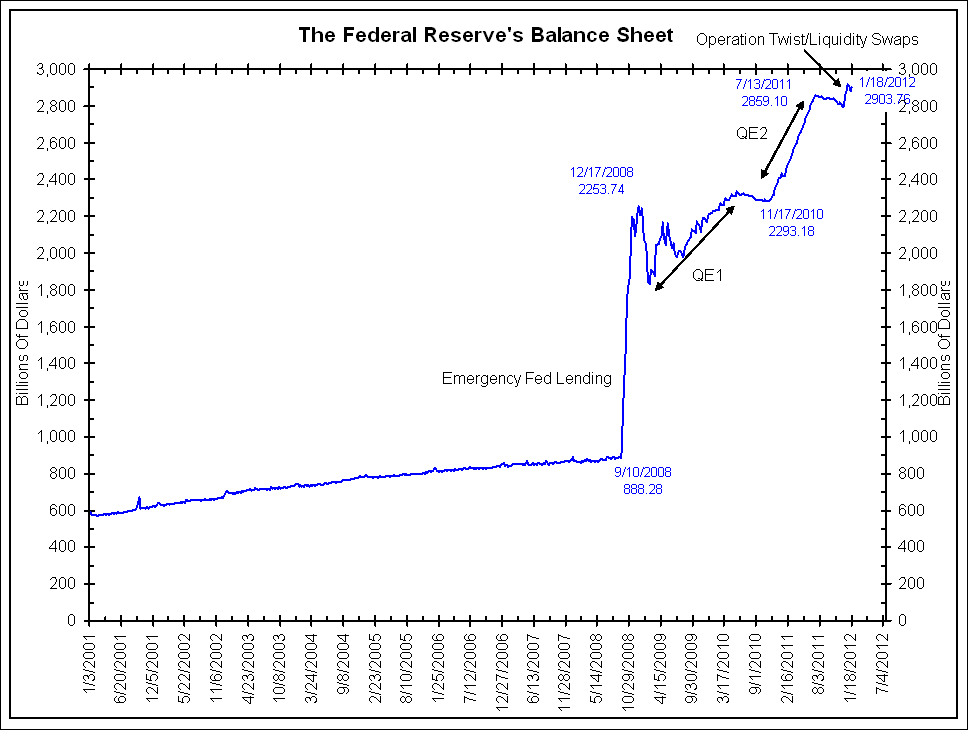
˜˜˜
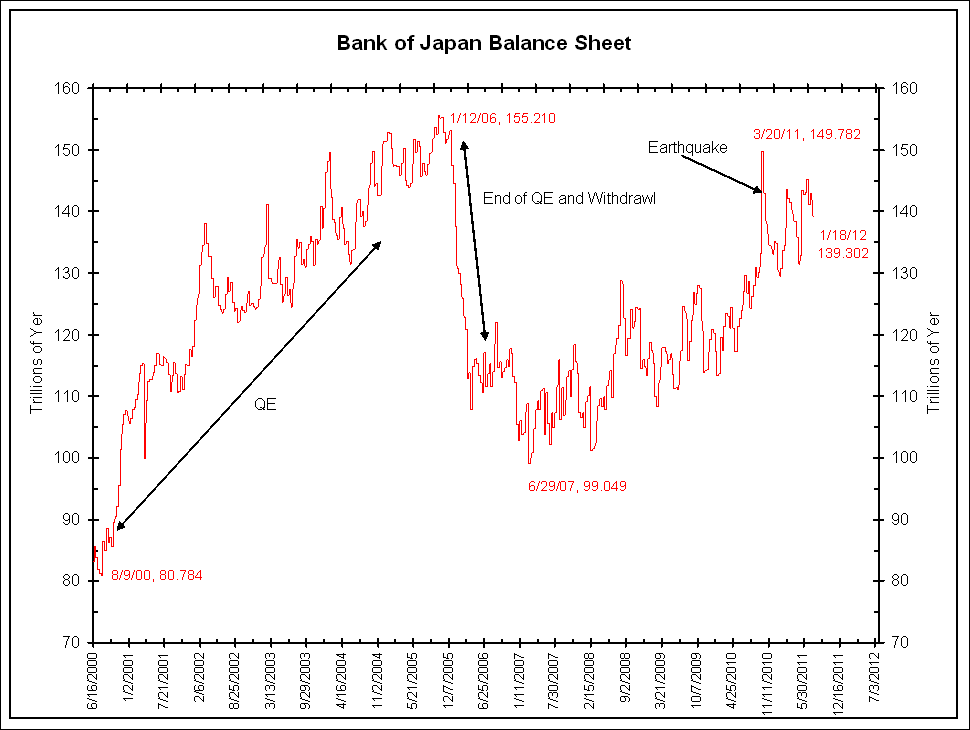
˜˜˜
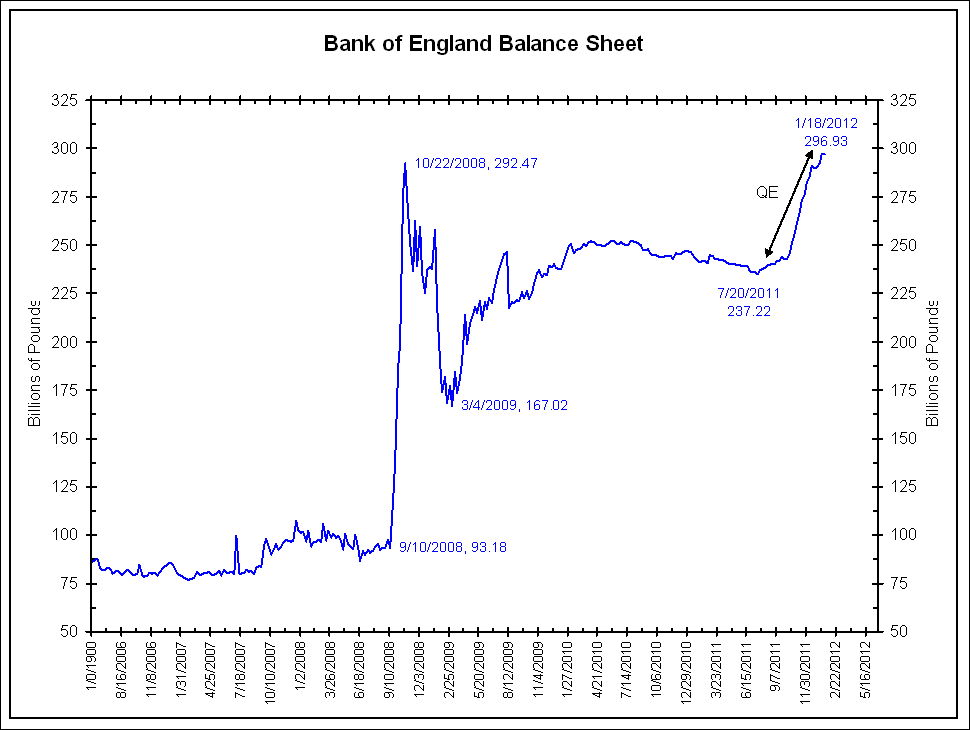
˜˜˜
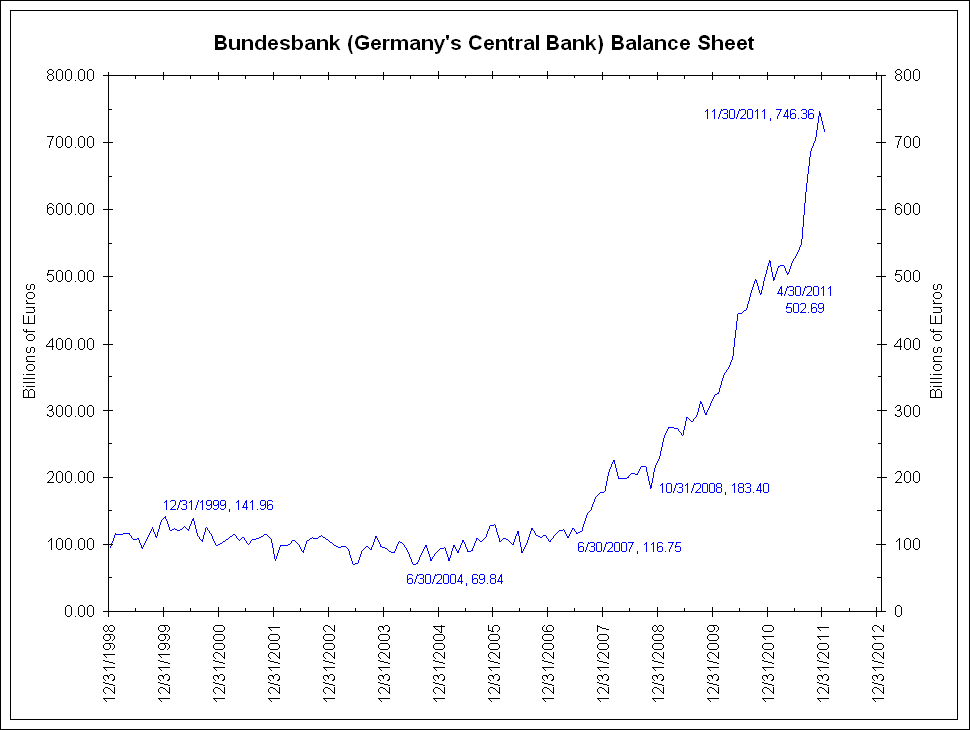
˜˜˜
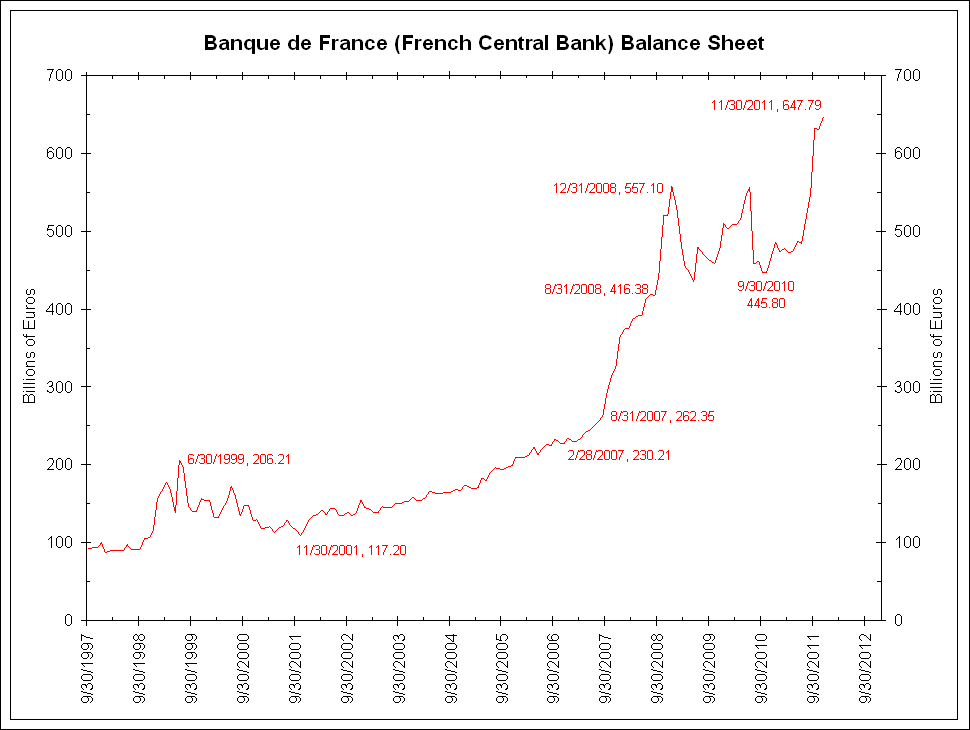
˜˜˜
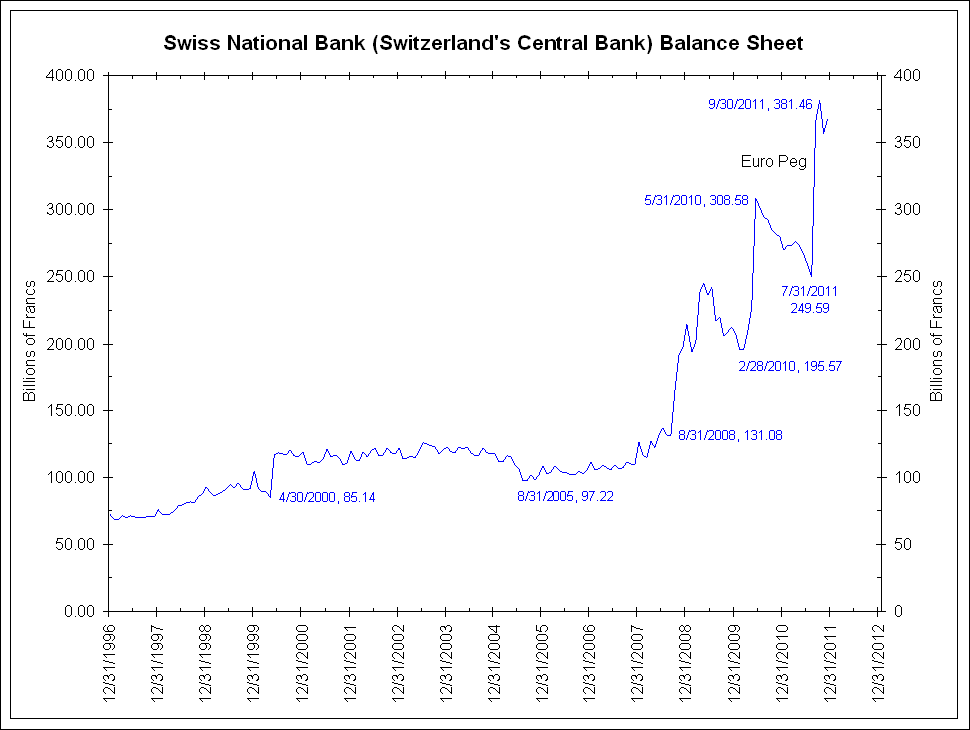
>
Comparing Central Bank Balance Sheets
For comparison's sake, we converted the eight balance sheets above into dollar terms. The four largest, the PBoC, the Fed, the BoJ and the ECB are shown in the first chart below. The second four, the Bundesbank, Banque de France, the BoE and SNB are shown in the second chart below. We split them up because of their vastly different scales.
In the first chart, note that the balance sheets of the PBoC and the ECB are larger than the Federal Reserve when converted to dollars. The BoJ used to be the largest balance sheet in dollar terms until 2006.
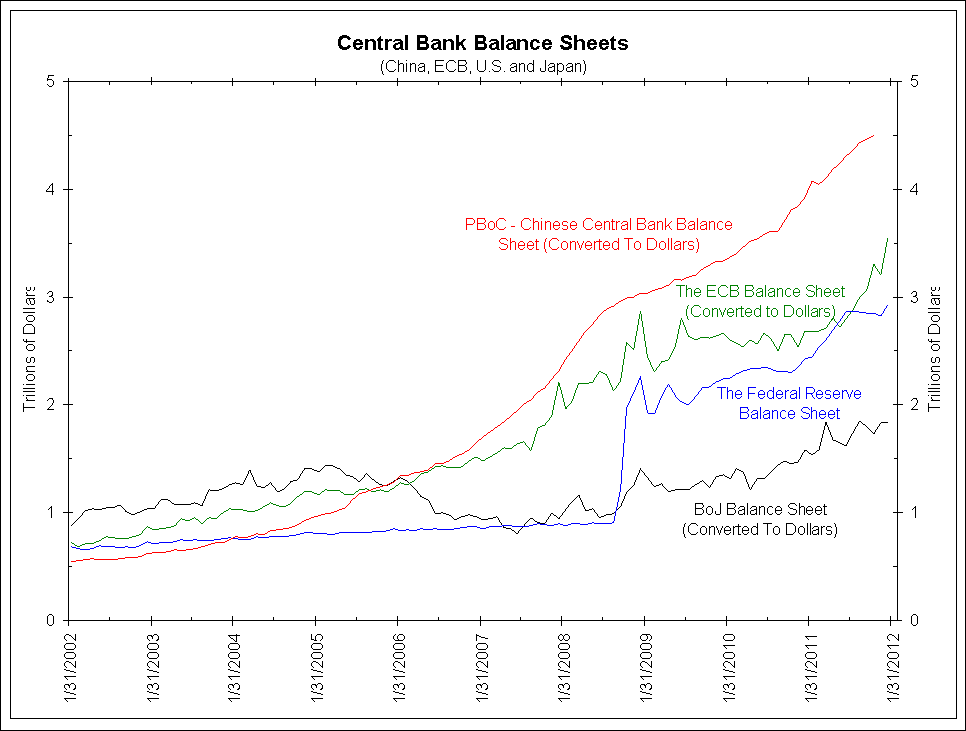
When shown in dollar terms below, the Bundesbank is the largest of the "second four" central banks. Further, its growth rate over the last five years has been among the highest. This is surprising since the Bundesbank is considered the "hard money" central bank.
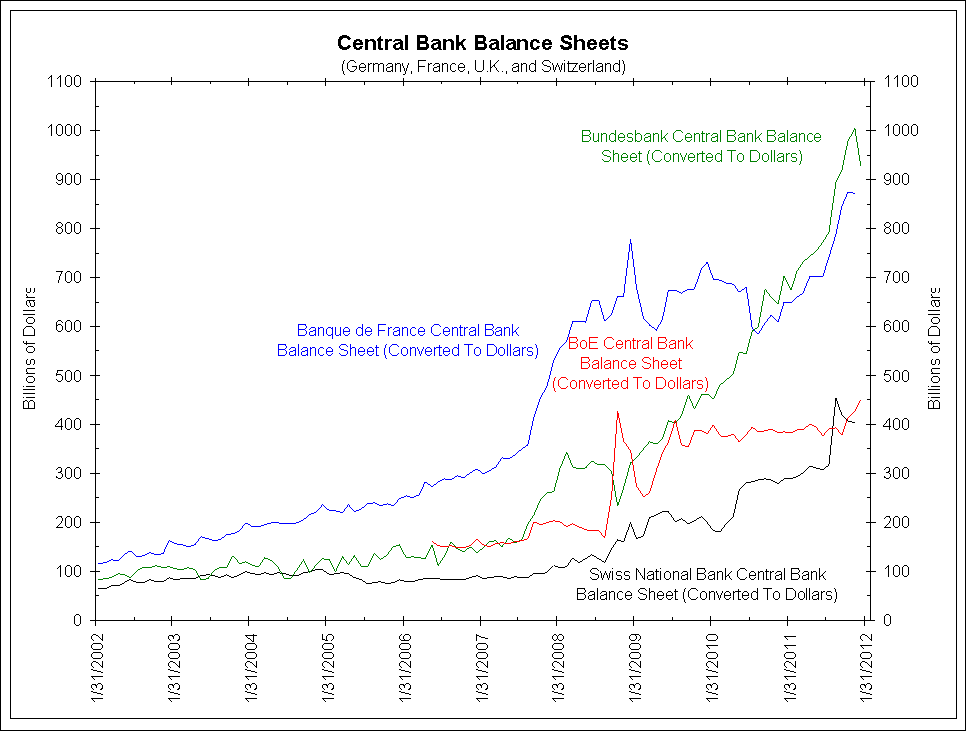
Combining Central Bank Balance Sheets
The next chart below adds up the eight largest central bank balance sheets in dollar terms. It is only current through October as that is the latest number from the PBoC.
The combined size of these eight central banks' balance sheets has almost tripled in the last six years from $5.42 trillion to more than $15 trillion and is still on the rise!
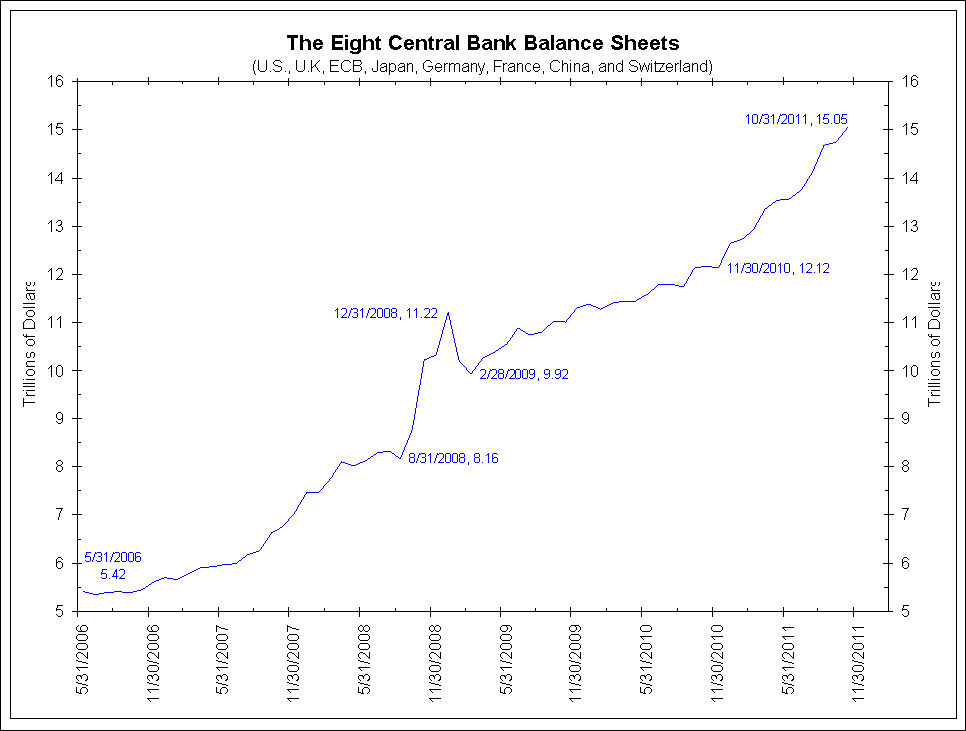
Central Banks Equal To One-Third Of World Equity Values
As noted above, QE is an expanding of balance sheets via increasing bank reserves. The purpose of QE, as explained by this Bank of England video, is to increase bank reserves through purchases of fixed income securities in order to lower interest rates. This makes fixed income securities relatively unattractive/overvalued and pushes investors out the risk curve. This should increase buying for riskier assets such as stocks, pushing them higher in price. Theoretically these higher prices should lead to a wealth effect and increased economic activity.
Given this definition and purpose, it is fair to compare the size of these balance sheets (now $15 trillion) to the capitalization of the world's stock markets (now $48 trillion). This is shown in the chart below.
Prior to the 2008 financial crisis, the eight central bank balance sheets were less than 15% the size of world stock markets and falling. In the immediate aftermath of Lehman Brothers' failure, these eight central bank balance sheets swelled to 37% the capitalization of the world stock market. But keep in mind that the late 2008/early 2009 peak was due to collapsing stock market values combined with balance sheet expansion via "lender of last resort" loans.
Recently, the eight central bank balance sheets have spiked back to 33% of world stock market capitalization. This has come about not by lender of last resort loans, but rather by QE expansion (buying bonds with "printed money") even faster than world stock markets are rising.
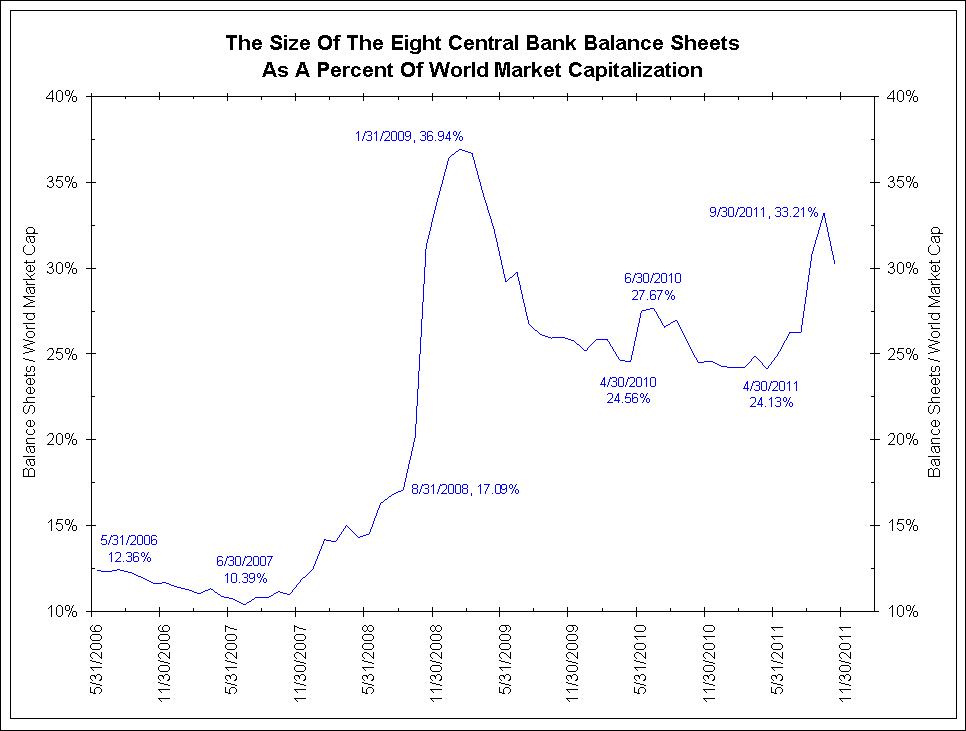
What Does It All Mean?
In our conference call earlier this month we said (page 12):
2011 was so difficult because all stocks seemingly moved together. It was as if every S&P 500 company had the same chairman of the board that knew only one strategy, resulting in a high degree of correlation between seemingly unrelated companies.
Massive central bank involvement in the markets risks returning us to a de facto centrally planned economy. Those S&P 500 companies all have the same chairman; it is Ben Bernanke because his policies are affecting everybody. That is what makes money management so difficult. Correlations will ebb and flow; they always do. But what makes them go away? This will only happen when governments and central banks go away.
But if they go away, then does that not mean things get ugly? Maybe they do get ugly, but it also means that we sort out the excesses in the market. We reward the people that do the right thing and we punish the people that do the wrong thing. And we have an adjustment process that may be ugly, but then we have a period of long expansion.
Central banks are ruling markets to a degree this generation has not seen. Collectively they are printing money to a degree never seen in human history.
So how does this process get reversed? How do central banks pull back trillions of dollars of money printing without throwing markets into a tailspin? Frankly, no one knows, least of all central banks as they continue to make new money printing records.
Until a worldwide exit strategy can be articulated and understood, risk markets will rise and fall based on the perceptions and realities of central bank balance sheets. As long as this is perceived to be a good thing, like perpetually rising home prices were perceived to be a good thing, risk markets will rise.
When/If these central banks go too far, as was eventually the case with home prices, expanding balance sheets will no longer be looked upon in a positive light. Instead they will be viewed in the same light as CDOs backed by sub-prime mortgages were when home prices were falling. The heads of these central banks will no longer be put on a pedestal but looked upon as eight Alan Greenspans that caused a financial crisis.
The tipping point between balance sheet expansion being bullish for risk assets versus bearish is impossible to know. Given the growth rate of central bank balance sheets around the world over the past few years, we might not have to wait too long to find out. Enjoy it while it is still bullish.
Iran has agreed to be paid 45 percent of revenue from its Indian oil exports in rupees, to be deposited with an Indian bank beyond the reach of new US and European sanctions, a report said Thursday.
The two countries have chosen UCO Bank, headquartered in the eastern city of Kolkata, for the rupee transactions to settle part ofIndia's $12.68-billion annual oil bill, The Indian Express reported.
India currently pays for 20 percent of its oil imports from Iran in rupees, with the remainder settled in euros at the Turkish bank, Turkiye Halk Bankasi.
There are concerns that the Turkish route will be closed by tough new European sanctions on oil exports from Iran imposed over the Islamic Republic's disputed nuclear programme.
India has said it will continue to buy crude from Iran despite moves by the US and Europe to further isolate the country, which accounts for 12 percent of India's annual oil imports.
ITC may hike stake upto 25% in EIH & Hotel Leela: Deveshwar
Published on Fri, Jan 27, 2012 at 13:15 | Source : CNBC-TV18
ITC chairman YC Deveshwar has said that his company may increase stake in the Oberois controlled- EIH and Krishnan Nair-owned Hotel Leela , if the prices are attractive.
In the same breath, he added that it was for the treasury division to take a call on that. Speaking to CNBC-TV18, Deveshwar said the company's investments in EIH and Hotel Leela were purely treasury decisions. "We are a buyer and seller in EIH, Hotel Leela at the right price," Deveshwar told CNBC-TV18.
Under the new Sebi takeover code, an acquirer can buy up to 25% in a target company without having to make an open offer.
Earlier, the threshold limit beyond which the acquirer had to compulsorily make an open offer was 15%. ITC holds 14.98% in EIH, and a little over 13% in Hotel Leela, as on December 31, 2011.
ITC started buying EIH shares in 2001, and built its stake in Hotel Leela over the last three years. While Deveshwar may deny any plans of taking control of the two firms, the market is skeptical if ITC will be content to remain a passive investor in these companies for long.
More so, in the light of the latest statement by Deveshwar, who expects also shares of hotel companies to underperform near term because of poor earnings arising from a sluggish global economy. On Wednesday, Indian Hotels reported a tepid 7.4% year-on-year growth in quarterly revenues, despite the quarter being the best for the hospitality sector in general.
In August 2010, RIL picked up a 14.2% stake in EIH, ostensibly to help the Oberois pre-empt a hostile bid by ITC. Market watchers are keenly watching if ITC would want to challenge the Ambanis by increasing their stake in EIH to the maximum permissible 25%.




